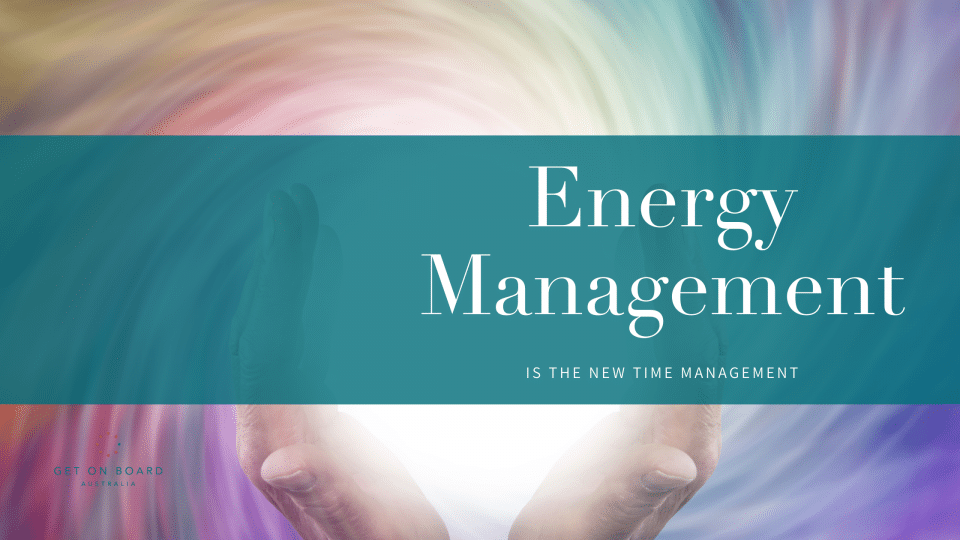Manage your Energy; Manage your [Board] Life

As a new or aspiring board member, there is a very high likelihood that you are (or will be) serving on a board while holding other roles; full-time professional, parent, partner, friend, family member, sport team member.
We know that managing our time is important, but it will only get us so far. Ensuring you have the energy to do all the things on your schedule, at the level you and others have come to expect from you, is essential.
Being a multiple role-playing superstar, it’s important to develop habits and systems that enable you to play each role at your desired and required energy level. It’s what Brad Waldron calls “playing from a 10”.
Effectively managing our energy is a deeply personal experience and what works for me may not work for you and your life. I find that being aware and intentional is a universal first step. Secondly, trying different things to find what works for you will help you to discover how best to manage your energy based on your life and what you’re trying to achieve.
Here are some things that I have found that help me to manage my energy (something that became a high priority after experiencing a stroke). Perhaps they will give you some ideas or places for you to start being intentional about managing your energy.
- Be crystal clear on ALL of your life roles. What are your big rocks? Your big rocks are those things that are most important to you: family, career, exercise, study, rest, etc. Whatever you want them to be. Knowing and intentionally choosing the most critical areas that you want to spend your energy and time on is the first step towards managing your energy.
- Plan your week around these roles. Does your schedule reflect the things most important to you? Reflecting on your previous week, did you spend time and energy in your most important areas? It’s important to regularly check-in that you are investing energy into the things that you have highlighted as important to you and that your weekly schedule aligns with your goals. You will also begin to recognise the need of doing fewer things well. Not overloading yourself means that you know your limitations and you thrive within them.
- Work smarter: Single tasking.
In a world of multitasking, single-tasking (focusing on one thing at a time) is a super power. – Tim Ferriss.
Whatever you’ve planned to do at a particular time, just do that thing. Constantly task switching or multi-tasking is incredibly difficult for our brains and virtually guarantees you will feel more tired, more quickly, and you will get less done. When it takes us, on average, 23 minutes and 15 seconds to regain deep focus after an interruption, minimising task switching behaviours can be incredibly valuable and energy sustaining.
- Work smarter: go minimal. Email and instant messaging systems may not be the panacea for productivity that we were promised. As mentioned in the point above, constant distractions and managing your day via your inbox puts us in an unideal state of mind; one that delivers less value and output than we are capable of. And it makes us miserable. Consider your mobile phone and/or tablet in this mix as well. Is it getting in the way of you having focused time on that big rock you’re wanting to invest in?
- Know YOUR best time of day. The best book I’ve read about this is The Power of When by Michael Breus, PhD. His model of the four different chronotypes will help you to understand when the best time of day is for you to do anything. His quiz is available online at https://thepowerofwhenquiz.com/.
- Schedule in or factor in down time / relaxation. Rest is an action and a necessity.
- SLEEP. Know how much you need and be completely honest with yourself about it! Aim to get that amount of sleep every night (or most nights).
Is your phone or tablet getting in the way of your sleep? Survey results would suggest you’re not alone! 89% of adults say that they are losing sleep because of their bedtime mobile phone use. Another frightening statistic was that 1 in 10 adults reported checking their phone during s*x! Now that’s an addiction. Like a drug or a pokey machine, social media apps and games are designed to keep us using and coming back for more. Whilst they may be free, you’re paying with your attention (which is then sold to companies). At the end of the day you’re losing out and you don’t get a cent in return. They are also a mood and energy sap. - Move, Eat Well, Drink More Water. We know this. And there are plenty of ways to achieve all three of these. Find what works for you. Repeat.
Energy management is the new time management. Sustaining a high energy level is a deeply personal experience and what works for me may not work for you and your life. Being aware and intentional is a universal first step.
Secondly, try different things to find what works for you. Discover how best to manage your energy based on your life and what you’re trying to achieve.
Learn more
[read] Why you should manage your energy, not your time
[listen] How to Make Deep Work Happen, with Cal Newport
Subscribe to Receive Access to Articles, Resources, and Tools to Support Your Board Goals.
